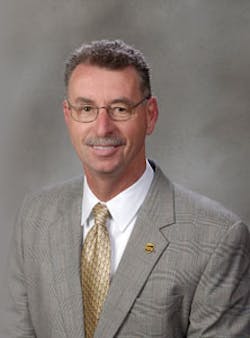Time Flies When You’re Having Fun
Q: How did you get involved in the aviation industry?
A: I left the Navy in 1972 with a background in electronics. At the time, my father worked in technical services with Eastern Airlines at John F. Kennedy International Airport and he insisted I put in an application. I was hired and worked for Eastern Airlines for 15 years. I spent five years as a mechanic in the old Hanger 9 at JFK, three years as a maintenance instructor in Miami and Atlanta and seven years in management in Atlanta.
As problems at Eastern Airlines increased, in 1987 I applied with UPS in Louisville when I heard they were starting an airline. I began my UPS career as a mechanic in the Louisville GSE shop in January 1988 and have been at UPS ever since. I have spent 35 years in the transportation industry and time has flown by.
Q: What are some of the major trends you have seen developing over the past 20-30 years?
A: With the current struggles of profitability in the industry, transportation companies continue to search for ways to reduce maintenance expenses. We are looking at new methods of working smarter and improving the efficiency of our standard processes.
Another trend has been the increased realization of the benefits of working together. It’s through cooperation, collaboration and old fashioned teamwork that we can run a successful, efficient maintenance operation.
The last trend has been coming for many years — the need for transportation companies to consider the environment in daily operations. At UPS, we realize the need for more environmentally friendly fuels, more efficient equipment uses and we are exploring new technologies and methods to reduce our impact on the environment. There are challenges associated with such enhancements including additional costs, but our industry should continue to find solutions to benefit both the environment and business.
Q: What are some of the biggest challenges you have faced over the years?
A: The biggest challenge for me has been building a team that believes in the manager’s vision. I am blessed to work with some of the best GSE management in the industry. Most began their careers as technicians and they believe a successful, preventative maintenance program is the key to equipment reliability, longevity and reduced maintenance cost.
Our small UPS GSE group runs an exceptional program that affects every UPS gateway around the world. We purchase equipment, containers, pallets and nets. The group also works with the OEMs to resolve equipment problems, implement product improvements and monitor warranty submission and collection. The team works hard and is dedicated to the success of UPS’s maintenance program.
Q: What do you favor most about working in this industry?
A: The small size of the GSE industry makes it unique. We all know each other personally and work closely to solve common problems. Working with GSE manufacturers is easier than other industries because they’re receptive to ideas that will ultimately improve their product.
Q: What changes would you like to see made in the industry?
A: I would like the GSE manufacturers to understand that a high quality product which requires less maintenance will benefit all parties involved and ultimately be less expensive than making frequent repairs to equipment in the field. The example set by successful automobile manufacturers shows that quality assurance processes implemented early in engineering coupled with high quality supplier parts and quality-driven manufacturing processes will lead to huge dividends. It all comes down to the value proposition, we will purchase what we feel gives us the most value for the money.
Q: What advice would you give to those new to the industry?
A: To those new to the industry, I offer words from UPS founder Jim Casey that still have relevance today. During a talk in 1947, Jim Casey said “Above all, no matter how capable you may think you are, don’t over-rate yourself. Once you make up your mind that you are ‘pretty good’... you will no longer feel the urge to do better. Lean a little the other way — be constructively dissatisfied with yourself — and you’ll go further.”
